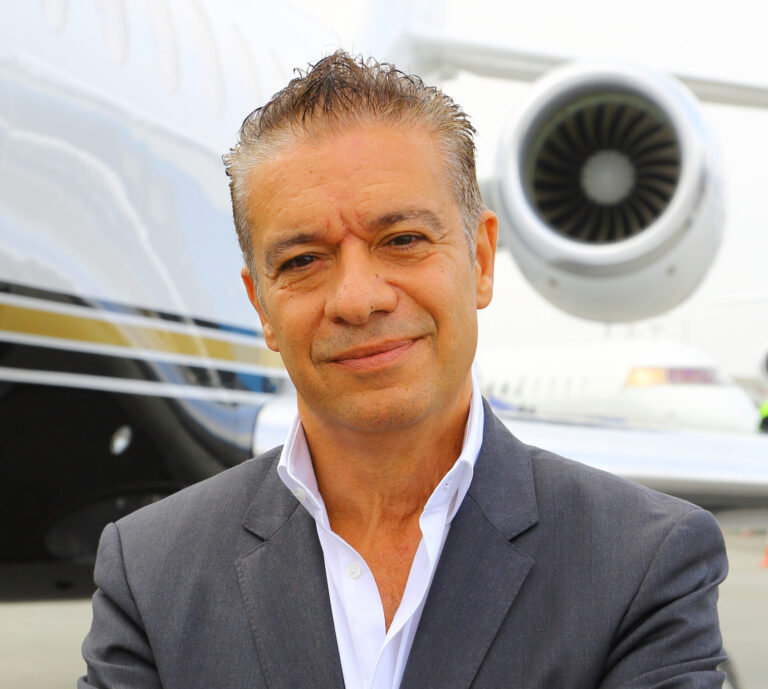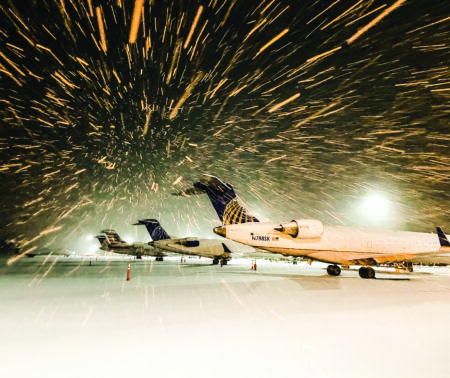Sitting across from George Galanopoulos, CEO of Luxaviation UK on the company’s latest fleet addition, an Embraer Praetor 600 jet, it is hard to believe aviation wasn’t his first career choice. Galanopoulos fell into business aviation completely by chance after meeting a stranger in a bar.
“I came to the UK from Greece when I was 20 to study computer science because I hadn’t done very well in school. My grades weren’t good and I didn’t get into any universities in Greece,” he says. “My parents told me to make something of my life, so I came to England to study.
“I was going to university and working at a bar in London, and one day this guy walked in, and I became friendly with him. He asked me what I did and when I told him what I was studying at university, he told me to forget that and instead become a pilot.
“I had no interest in becoming a pilot, but he told me to trust him.”
A few days later the man from the bar took Galanopoulos flying on an old Piper Navajo twin-engine plane from Luton to Oxford. “From that moment I was hooked,” he says. “I dropped my computer science degree and I started to fly.”
It took Galanopoulos five years to gain his commercial licence. “I didn’t have much money, so I was taking it slow,” he says, but he never looked back.
Galanopoulos’ first job was as first officer on a Citation based at London Stansted. “I was a flying instructor at the same time,” he says. “Then I started working for an individual that started a small air taxi company with propeller aircraft. The first contract we had was the London Lookout Flying Eye. I was flying a reporter around London over the traffic for two hours in the morning and two hours in the evening.
“We built the business up and I bought the company from him a few years later. Back then it was only a small air taxi, but I guess it just grew over the last 25 years.”
Attracting talent

Galanopoulos insists that the business aviation industry is like a family. “Some of my colleagues say it’s like the mafia,” he jokes. “Once you are in, you never leave! But it is an addictive industry. I say to young people, money-wise this isn’t the greatest industry, you could make more elsewhere. But if you want to be happy, this is a great industry to be part of.
“If people didn’t love it, they wouldn’t stay. But we still find it very hard to get young people to come into the industry. And I can never understand that. I find that strange,” Galanopoulos says.
“Part of what I’ve tried to do with my social media presence and the podcast that we have started is to make people think about our industry as an option. If you’re a school leaver, and you have no real connection to aviation, I doubt you would consider aviation as a career. But it is a great industry to be part of, and not just as a pilot, but as an engineer, or working in operations. There are so many different roles,” he says.
“There is a drive now to do more through industry associations. They are trying to advance the industry and are going into schools and universities.
“We have a partnership with Stansted Airport college. I’ve been there and spoken to the students a couple of times. Interestingly these people are there for aviation, but many still don’t consider business aviation as an option. We’ve got a lot of work to do on that.
“When I started, business aviation was a stepping stone to get to the airlines, if you’re a pilot or an engineer, you would use business aviation to move up to the commercial companies. But that has changed. Business aviation is a bigger, more established sector, the pay is better than for a commercial pilot and they have to work a fraction of the time.
“They get to meet people and go to different destinations rather than doing two or three different routes every day. It’s a very attractive industry.”
Different routes

Galanopoulos believes that he works in the best industry in the world. But he understands that becoming a pilot can be costly. “You don’t need to be highly intelligent or have a university degree to become a pilot. You just need to find the most cost effective way to do it,” he says.
If someone is interested in becoming a business jet engineer, Galanopoulos states it is no different to becoming a car engineer. “You have to go to college, build your experience up and eventually get your first job.
“Operations sales is another great job in the industry, we get people from different walks of life joining our team.
“You don’t have to have aviation experience, most of the people that we have in the office, they have no aviation background, they just fell into it, then they came to us, and we train them.”
Luxaviation views itself as a unique company. One of the reasons for this is its large size. “We are the largest business aircraft management company in the world now,” he explains. “We manage 210 aircraft worldwide.”
Luxaviation differs from other management companies as the group has individual entities around the world.
“We have entities in the UK, France, Belgium, Northern Europe, Dubai, South Africa and Australia, and every entity is run by a different team independently,” Galanopoulos says.
This means for a client that owns an aircraft they want managed, or someone who wants to charter an aircraft, they are not left feeling like one of many, not experiencing any personal touches. “People can go to a big company and get lost in the numbers, but thanks to our business model you get looked after as much as you would at a smaller company – we have more of a family business feel.”
According to Galanopoulos the company is constantly growing, and he is hoping to add more aircraft worldwide.
“Our San Marino AOC is one of the fastest growing. We are adding aircraft in the Middle East as well as in the UK. The Embraer Praetor 600 we are sitting in is our second aircraft addition this year. We’re hoping to add a third one to the UK fleet very soon.”
Sustainability matters

Galanopoulos insists that Luxaviation takes sustainability seriously: “We have already started efforts to optimize our routings and recommend choices to our clients so they can minimize the carbon footprint of their journey.
“We do a lot as an industry, we just don’t talk about it enough. I think that’s why we are challenged by protesters. They don’t fully understand what business aviation is doing.
“I don’t buy into this ‘we are only 2% of the world’s emissions’ though, because it really doesn’t matter what your emissions are, you still need to do something about it.”
Galanopoulos believes this stance is especially important when it comes to the younger generation. “I’ve got children, and they tell me they won’t tell their friends what I do because aviation isn’t seen as a good industry to be part of. How do we change that perception? They are taught from an early age that you need to look after the environment, so we need to be seen to be taking action.
“Business aviation is such a highly regulated industry, we are used to having to comply. Sustainability, is another important thing that we have to deal with.”
It is well-documented that the industry has its sights set on achieving net zero by 2050. Despite some naysayers having doubts, Galanopoulos is confident.
“I’m convinced that we are going to do it,” he says. “Of course, it’s not all down to operators. We operate aircraft and if they run off fossil fuels, we will continue to operate them. However, there are adjustments that can be made, for example more efficient engines and more direct routes. As a group, we are working hard to be part of the wider improvement.”
Though when it comes to electric aviation, Galanopoulos believes it is a short-term solution. “In the next three to five years we will see some innovation on aircraft becoming electric, or hybrid, but I think sustainability should be our main focus for the next few years,” he says.
“Electric is not completely sustainable, and it will always have its limitations. I cannot see an airline flying 12 hours on batteries, but it’s a great initiative especially for short haul flying. I think anything up to an hour, maybe two hours flying using electric aviation is great, but we need to look more into hydrogen – this is the way forward.”
Galanopoulos believes that the attitude of people outside of aviation towards the sector is always going to be a challenge to manipulate.
“Public perception of sustainability is always going to create a bit of anti-business aviation feeling, but I hope eventually people will understand the value that he industry brings to the economy.”
He believes that a change in clientele will be the catalyst for this transformation.
“Now we are seeing YouTubers, people in tech, soccer players and influencers using business aviation and they are the type of people that they like being seen in a private jet.
“They will take photos for social media, and I believe that will slowly change the way people view the industry.”





